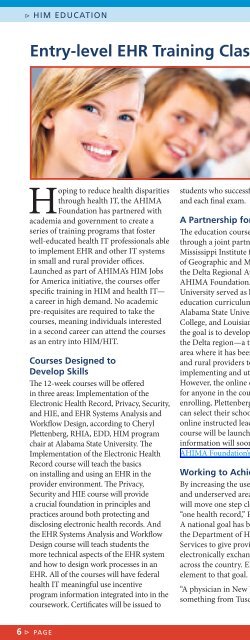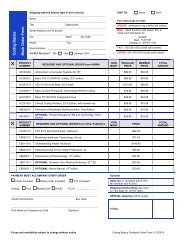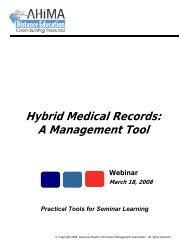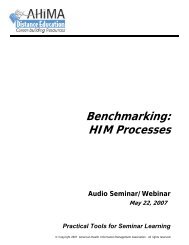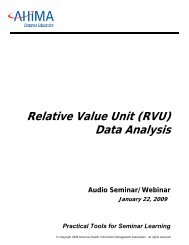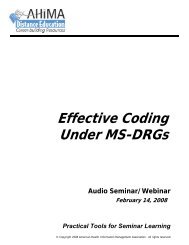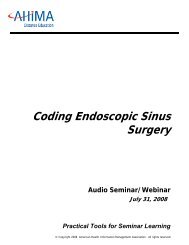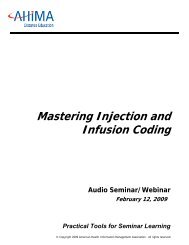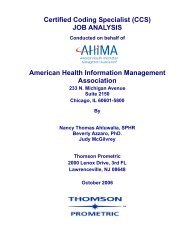AHIMA Advantage - AHIMA Body of Knowledge - American Health ...
AHIMA Advantage - AHIMA Body of Knowledge - American Health ...
AHIMA Advantage - AHIMA Body of Knowledge - American Health ...
You also want an ePaper? Increase the reach of your titles
YUMPU automatically turns print PDFs into web optimized ePapers that Google loves.
▷ HIM EDUCATIONEntry-level EHR Training Classes LaunchHoping to reduce health disparitiesthrough health IT, the <strong>AHIMA</strong>Foundation has partnered withacademia and government to create aseries <strong>of</strong> training programs that fosterwell-educated health IT pr<strong>of</strong>essionals ableto implement EHR and other IT systemsin small and rural provider <strong>of</strong>fices.Launched as part <strong>of</strong> <strong>AHIMA</strong>’s HIM Jobsfor America initiative, the courses <strong>of</strong>ferspecific training in HIM and health IT—a career in high demand. No academicpre-requisites are required to take thecourses, meaning individuals interestedin a second career can attend the coursesas an entry into HIM/HIT.Courses Designed toDevelop SkillsThe 12-week courses will be <strong>of</strong>feredin three areas: Implementation <strong>of</strong> theElectronic <strong>Health</strong> Record, Privacy, Security,and HIE, and EHR Systems Analysis andWorkflow Design, according to CherylPlettenberg, RHIA, EDD, HIM programchair at Alabama State University. TheImplementation <strong>of</strong> the Electronic <strong>Health</strong>Record course will teach the basicson installing and using an EHR in theprovider environment. The Privacy,Security and HIE course will providea crucial foundation in principles andpractices around both protecting anddisclosing electronic health records. Andthe EHR Systems Analysis and WorkflowDesign course will teach students themore technical aspects <strong>of</strong> the EHR systemand how to design work processes in anEHR. All <strong>of</strong> the courses will have federalhealth IT meaningful use incentiveprogram information integrated into in thecoursework. Certificates will be issued tostudents who successfully pass the coursesand each final exam.A Partnership for SuccessThe education courses were developedthrough a joint partnership between theMississippi Institute for the Improvement<strong>of</strong> Geographic and Minority <strong>Health</strong>,the Delta Regional Authority, and the<strong>AHIMA</strong> Foundation. Alabama StateUniversity served as lead developer <strong>of</strong> theeducation curriculum. Offered throughAlabama State University, TougalooCollege, and Louisiana Tech University,the goal is to develop HIT expertise inthe Delta region—a typically underservedarea where it has been difficult for smalland rural providers to find assistance inimplementing and utilizing EHR systems.However, the online courses are openfor anyone in the country interested inenrolling, Plettenberg said. Studentscan select their school <strong>of</strong> choice for theonline instructed lead courses. The firstcourse will be launched this spring. Moreinformation will soon be available on the<strong>AHIMA</strong> Foundation’s Web site.Working to Achieve a GoalBy increasing the use <strong>of</strong> EHRs in ruraland underserved areas, the countrywill move one step closer to the goal <strong>of</strong>“one health record,” Plettenberg said.A national goal has been developed bythe Department <strong>of</strong> <strong>Health</strong> and HumanServices to give providers the ability toelectronically exchange health recordsacross the country. EHRs are a keyelement to that goal.“A physician in New York wantssomething from Tuscaloosa, AL, he typesit in a health information exchange andhe can get it. That is the final goal <strong>of</strong> all <strong>of</strong>all <strong>of</strong> this, and to do that you have to trainthe providers and their staff,” Plettenbergsaid. A second goal is to allow people anentry point into the health IT workforce.“This is a beginning, entrance-levelstart for people,” Plettenberg said. “Theywill not start out as managers, but theycertainly will be able to go in and work inphysician <strong>of</strong>fices and other settings, do thisinput, and understand what this means.”HIM Jobs for America was launchedin October 2011 as a sustained effort tosupport <strong>American</strong> employment and helpimprove the healthcare <strong>of</strong> underserved<strong>American</strong>s in communities acrossthe country.<strong>AHIMA</strong>’s “HIM Jobs for America”Initiative includes a legislative platformthat addresses:• A tax credit that provides incentivesfor employers that provide training toprepare credentialed HIM practitionerswith the core job skills demandedby an integrated electronic healthinformation system.• A tax credit that provides incentivesfor employers that provide retrainingand/or additional training to currentHIM workers that prepares them tocontribute to the development andoperation <strong>of</strong> an electronic healthinformation environment.• HIT Pro competency exams, whichconfirm that workers’ experiencesand skills satisfy the nation’s needfor health IT. Employers wouldreceive equal credit for all their HIMpr<strong>of</strong>essionals who pass the exam in lieu<strong>of</strong> formal training.• Expanding and funding baccalaureateand graduate-level curricula to furthereducate the next generation <strong>of</strong> HIMpr<strong>of</strong>essionals through incentives toaccredited state and land-grant collegesand universities as well as scholarshipsfor students who pursue an HIM degreeat or beyond a baccalaureate degree.Learn more about <strong>AHIMA</strong>’s HIM Jobsfor America initiative by contacting the<strong>AHIMA</strong> Foundation. v6 ▷ PAGE<strong>AHIMA</strong> ADVANTAGE


